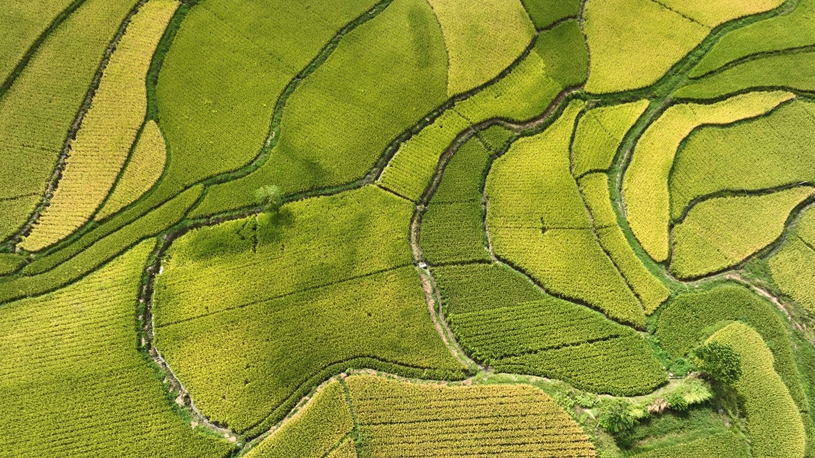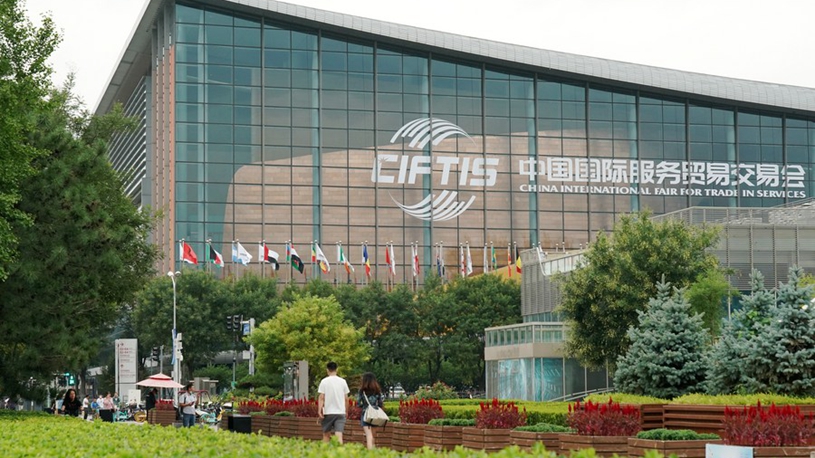Video: A Chinese specialty mushroom supplier is seeking to expand its presence in the U.S. market by adding more production capacity and extending business chains. (Xinhua)
Starting from 2013, Qihe has set up five subsidiaries in the United States, enjoying a dominant role in the shiitake mushroom market in the country.
NEW YORK, Sept. 1 (Xinhua) -- Chinese specialty mushroom supplier Shandong Qihe Biological Technology Co., Ltd. will continue to expand its presence in the U.S. market by adding more production capacity and extending business chains, according to an executive in charge of the company's operation in North America.
Qihe operates mushroom growing farms in Cumberland County, New Jersey and Seattle of Washington with daily output at 20,000 to 30,000 pounds and around 5,000 pounds, respectively, said Du Xingpeng, head of Qihe's operation in North America.
The daily production capacity of the mushroom production farm in Cumberland could increase to 50,000 pounds while the production capacity in the Seattle farm could reach 15,000 to 20,000 pounds, said Du in a recent interview with Xinhua.
In particular, the farm in Cumberland County has 75 mushroom growing green houses in operation and also serves as a transfer center of containers.
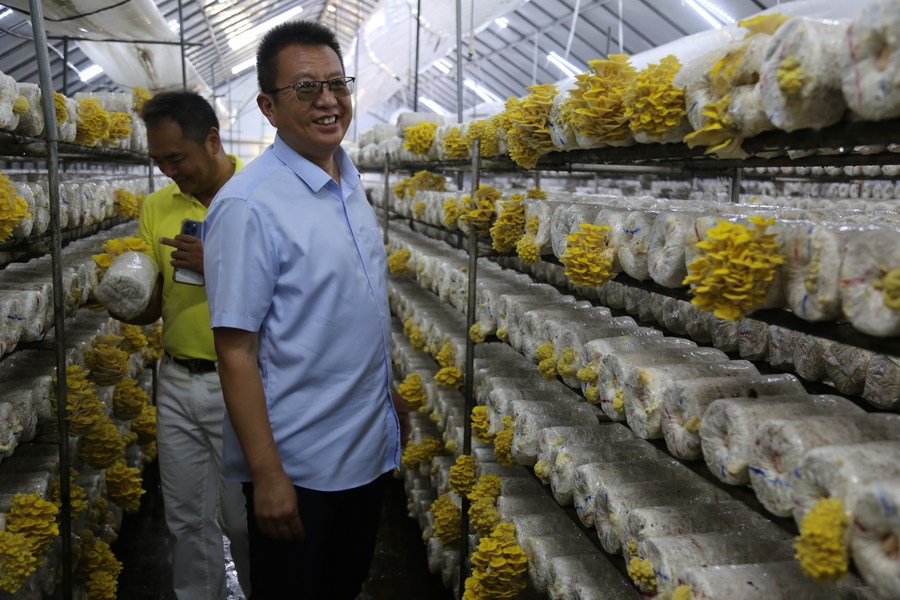
Du Xingpeng (Front), head of Qihe's operation in North America, checks yellow oyster mushroom spawn logs in a green house at Qihe's mushroom farm in Cumberland County, New Jersey, the United States, on July 30, 2022. (Xinhua/Liu Yanan)
Moreover, Qihe will build a fully intelligent mushroom growing farm in Atlanta, Georgia with a designed production capacity of around 50,000 pounds each day, said Du.
Qihe now has 11 mushroom growing green houses in Atlanta, which consumes around 1.5 million mushroom spawn logs each year.
Starting from 2013, Qihe has set up five subsidiaries in the United States, enjoying a dominant role in the shiitake mushroom market in the country.
Beside shiitake mushroom, Qihe is also cultivating grey oyster mushrooms, king oyster mushrooms, yellow oyster mushrooms and lion's mane mushrooms here in small quantities.
"The mushrooms here are really incredible ... I'm very excited to be here and have a taste of the mushrooms," said Alec Lasko, a resident in Cedarville of Cumberland County.
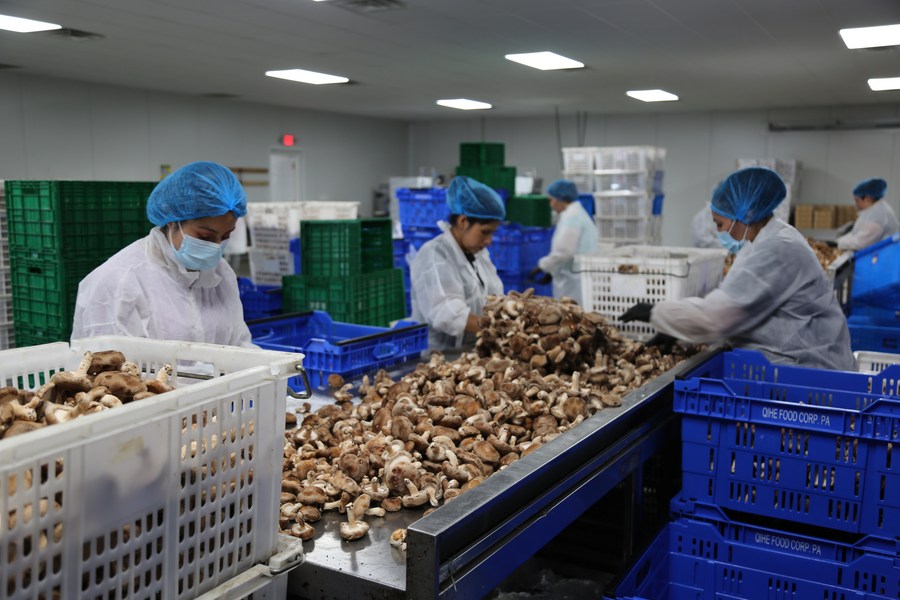
Workers sort out shiitake mushrooms before packaging at Qihe's mushroom farm in Cumberland County, New Jersey, the United States, on July 30, 2022. (Xinhua/Liu Yanan)
Though mushrooms in American culture aren't as popular as those in Chinese culture, a lot of Americans are discovering different cultures around the world, especially Chinese food and mushrooms, said Lasko, who sees specialty mushrooms as a neat product in the U.S. market.
It's learnt that button mushrooms, portabella and baby bella mushrooms take the vast majority of the U.S. mushroom market while consumption of shiitake mushroom is growing at around 15 percent each year.
Sales volume of mushrooms totaled 758 million pounds in 2020-2021 U.S. mushroom crop with sales value of 1.06 billion U.S. dollars, according to a report by the U.S. Department of Agriculture.
Around 120 containers of mushroom spawn logs are imported to the United States from China each month with 40 to 50 ones serving Qihe's mushroom growing farms and the remaining sold to outside mushroom growers in the United States, Du told Xinhua.
Qihe now employs more than 100 local people in the mushroom growing farms, according to Du.
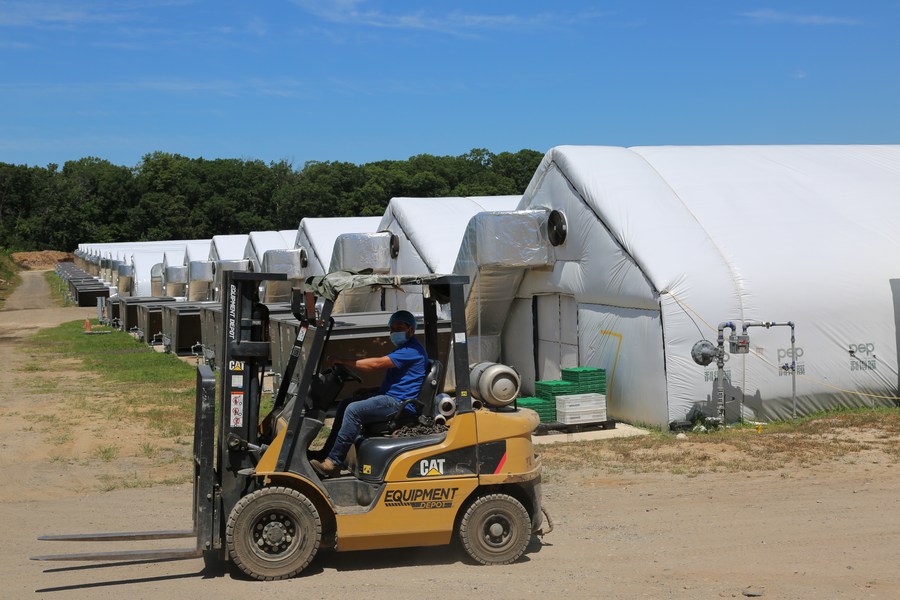
A man drives a forklift past green houses at Qihe's mushroom farm in Cumberland County, New Jersey, the United States, on July 30, 2022. (Xinhua/Liu Yanan)
Du said Qihe also plans to process mushrooms to make mushroom drinks and develop products for medical and cosmetological purposes.
Moreover, Qihe is working to convert discarded mushroom spawn logs into organic soil conditioner, which could enhance the output of produce by 10 percent to 20 percent, according to Du.
The conversion of waste mushroom spawn logs would help build an integrated industry chain with a closed loop, said Sheng Dongwei, a business partner of Qihe.
The production of soil conditioner would kick off by the end of 2022 with key technologies and equipment to be imported from China, said Sheng, who represents a Chinese solution supplier in this regard.
Headquartered in east China's Zibo city, Qihe makes mushroom spawn logs out of recycled twigs and branches from apple orchards and has built a business covering China, South Korea, Japan, the United States, Poland and others. ■




